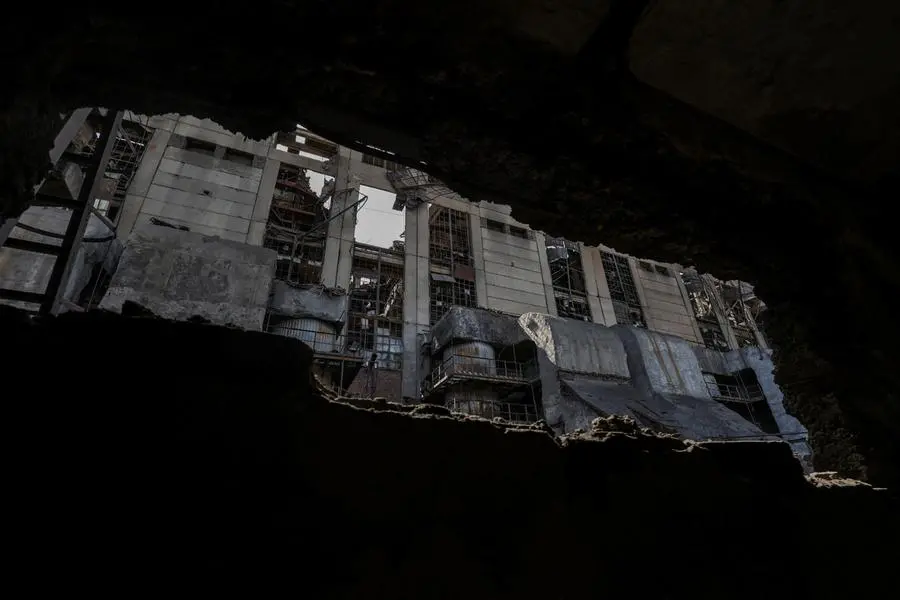PHOTO
Russia launched a barrage of missiles and drones at Ukraine on Wednesday, hitting nearly a dozen energy infrastructure facilities across the country, in the latest in a string of attacks on the power sector over the past two months.
Here is an overview of Ukraine's worsening energy situation since Russia's February 2022 full-scale invasion.
DAMAGE
Ukraine's energy system was badly damaged by a Russian air campaign in the war's first winter and only partially repaired. Russian forces renewed their assault on the grid on March 22, 2024, attacking thermal and hydro-electric power stations and the main power distribution substations.
Ukraine lost about 80% of its thermal power generation and about 35% of its hydropower capacity during the renewed attacks, officials said.
DTEK, Ukraine's largest private energy company which typically covers about a quarter of the nation's total energy needs, said the attacks had damaged five of its power plants and took out 80% of their capacity.
Smaller, state-owned Centenergo said it lost all its generating capacity after the Trypilska coal-powered plant outside Kyiv, a major supplier for the Kyiv region and two central regions, was destroyed on April 11. Its other station was destroyed in March and another one is occupied.
Officials say Russia has also attacked Ukrainian natural gas infrastructure, targeting underground storage facilities. Naftogaz said the state energy company's facilities had been attacked at least five times since March 2024.
NUCLEAR
Before Russia's invasion, Ukraine had one of Europe's largest electricity systems and was a net power exporter. In 2020, the installed capacity was about 54.5 GW and the mix was diversified.
Now Ukraine has to rely increasingly on its three nuclear power plants, which produce about 60% of its electricity.
Ukraine's six-reactor Zaporizhzhia, Europe's biggest such plant, was occupied by Russia at the start of its invasion.
Thermal and hydro-electric power generation are needed to keep the levels of supply and consumption balanced during peak hours of energy consumption in the morning and evening.
Ukraine is also developing renewable energy, hydro-electric power, solar, biogas and wind, which it sees as vital to creating a "decentralised" system that would be less vulnerable to Russian bombing.
BLACKOUTS
Russian attacks have forced authorities to impose rolling blackouts in multiple regions, but their full impact will likely be felt when seasonal energy consumption peaks at the height of summer and in winter.
Power companies and officials are urging Ukrainians to minimise their power use and avoid using more than one electrical household appliance at a time, especially during peak evening hours.
Ukraine consumed about 17-18 GW prior to the war, International Energy Agency data shows. No new data was available.
Ukraine's second largest city, Kharkiv, the surrounding region and several other frontline regions in the east are already facing rolling blackouts because of a power shortfall.
Analysts expect that to become larger in the summer as temperatures rise, which would in turn force the government to introduce broader blackouts in July and August.
The colder autumn and winter months will worsen that shortfall. Energy Minister German Galuschenko has called on residents and businesses to start preparing and to purchase power generators and power banks.
RESILIENCE
The government rolled out hundreds of "invincibility" centres offering food, drinks and warmth to people left without power during the first winter of the war. As of April 2024, more than 13,000 centres were functioning across the country.
The energy system has been connected to the European Union's united grid since the first weeks of Russia's invasion.
Ukraine can import about 1,700 MW of electricity from Europe and relies on imports from its Western neighbours to balance its system during peak hours. Kyiv hopes to increase these volumes.
Kyiv depends heavily on Western supplies of energy equipment and financial support to repairs its power system. Ukraine's government has set up a special fund to accumulate foreign funds to carry out repairs. (Reporting by Olena Harmash; Editing by Tom Balmforth and Alexander Smith)





















